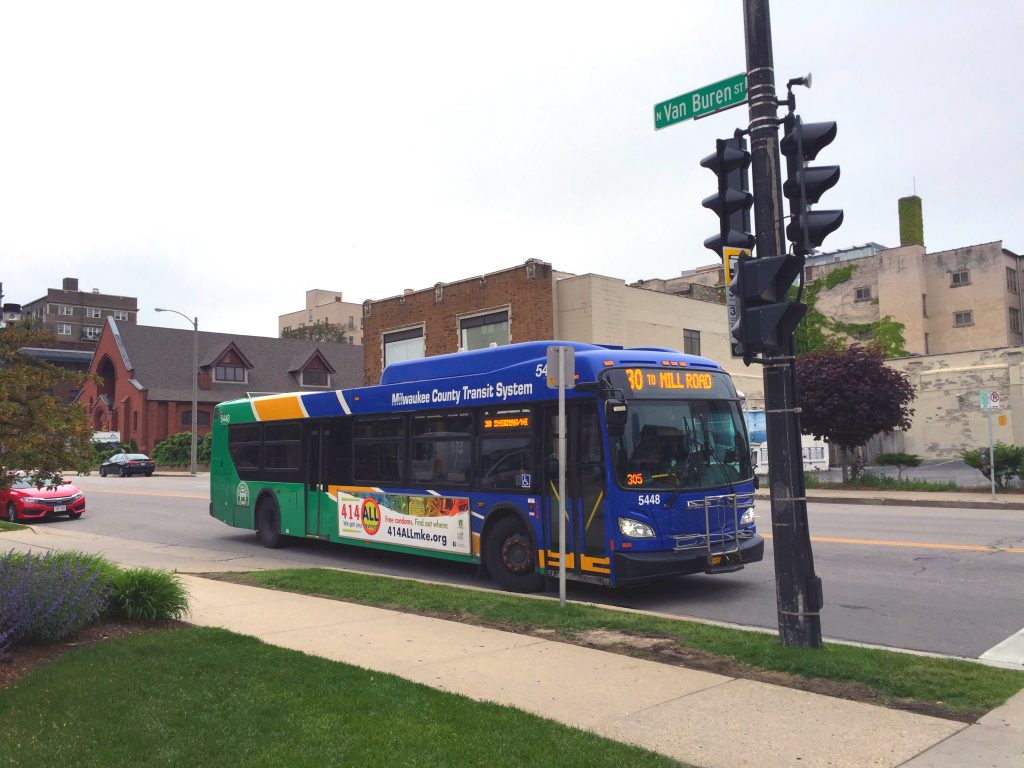Could Federal Grant Have Saved Bus Routes?
Some question how Abele administration used federal grant money.
Despite knowing for months that the transit system faced a budget deficit for 2019, Milwaukee County officials decided not to pursue a strategy to use federal air quality funding to maintain bus routes on the chopping block, as they had in previous years.
An application for a grant went before the committee on Transportation, Public Works and Transit for approval Wednesday. The grant program, called a Congestion Mitigation and Air Quality grant (CMAQ) has been used in the past by the Milwaukee County Department of Transportation (MCDOT) and the Milwaukee County Transit System (MCTS), in times of budget peril, to maintain service. This time around, despite a historic budget shortfall, they did not attempt to do this.
The last time county officials used the grant to mitigate service reductions, they used leftover CMAQ funding from scuttled projects — specifically, the Kenosha-Racine-Milwaukee (KRM) rail service and the county’s first attempt at Bus Rapid Transit. Julie Esch, MCDOT deputy director said there are no reprogrammable CMAQ funds available this year, like there was in the past. “Unfortunately, there are no other sources of funding to tap beyond those already identified in the 2020 requested budget.”
But a source familiar with the grant application process tells Urban Milwaukee the county transportation department considered trying to request funding in a way that would sustain some current services only to decide to instead apply for funding for a variety of expansion projects.
The application requests funding worth $27.9 million for a variety of projects, though likely not all will receive funding. The awards from this CMAQ cycle will go towards projects for state fiscal years 2023 and 2024, but, according to a report from MCDOT to the County Board, funding for requests in an earlier year might be approved.
In 2011, MCTS was set to receive a large reduction in state aid in 2012. Faced with the prospect of significantly reducing service, the system used wiggle room in the CMAQ grant process to save some of the bus service that would have been wiped from the map. As Urban Milwaukee reported then, “Due in large part to a reduction in state aid starting in 2012, the Milwaukee County Transit System had planned for a massive reduction in service. Thanks to some last minute creative planning by those at MCTS, the vast majority of those cuts are on track to be avoided thanks to the use of CMAQ funds.”
Urban Milwaukee contacted the county department of transportation a week ago with questions about its grant applications and never heard back until yesterday. Esch contends that CMAQ funds “may not be used for existing transit service” and “it is inaccurate to characterize CMAQ as bailout funding,” yet that’s essentially how the money received in 2012 was used. MCDOT was strategic and rather than applying for funds to save existing bus routes, it created new services along existing routes that were slightly changed from the original, but still technically a new service. Riders now know these services as the color coded lines: Greenline, Blueline and Redline.
As Urban Milwaukee reported, these color coded lines were very similar to previous express service lines, and were reconfigured thusly: “Service will stop approximately every 1/4 of a mile, compared to the current 1/8 mile standard MCTS service follows,” Jeramey Jannene reported.
Did the county’s grant writers consider a similar strategy this time around? Sources told Urban Milwaukee that many different options and approaches were considered by staff with the transportation department and MCTS. Ultimately the projects in the grant application include funding for marketing activities for MCTS, expansion of the MCTS mobile app/enhanced fare collection system, bus replacements in 2023, operating funds for the planned Bus Rapid Transit service in 2024, and two traffic signal improvement projects, one on Silver Spring Drive and the other for improvements on Oklahoma Avenue, S. 76th Street and S. 92nd Street.
The transportation department received the application guidelines after the July committee cycle deadline. So by the time the application for CMAQ funding went before the county board committee on Wednesday for its approval, the application had already been submitted and the committee could only give retroactive approval.
County Supervisors Marina Dimitrijevic and John Weishan, Jr. were obviously unhappy about this. Weishan said he has expressed concerns about this way of operating with department heads.
An exasperated Dimitrijevic asked, “Can you amend it?” referring to the application. “I don’t understand why I’m even talking about this if I have no authority over it.” She called the hearing “an absolute waste of time.”
She also criticized the approach used in the application. “It just doesn’t seem very strategic to me.”
Dimitrijevic questioned why the grant was for expansion of services while bus routes were being cut. “It’s very odd to me that we would use CMAQ money for the (mobile) app, which I like, but I feel like we need less app because we have less routes that are gonna be available.”
“I’m completely dissatisfied with this entire application,” she declared.
The committee laid over the item for more discussion at their October committee meeting.
If you think stories like this are important, become a member of Urban Milwaukee and help support real independent journalism. Plus you get some cool added benefits, all detailed here.
Political Contributions Tracker
Displaying political contributions between people mentioned in this story. Learn more.
Transportation
-
Congestion Pricing Cuts Air Pollution in New York City
 Dec 14th, 2025 by Jeff Wood
Dec 14th, 2025 by Jeff Wood
-
FTA Tells Milwaukee to Crack Down on Fare Evasion — Even Where Fares Don’t Exist
 Dec 12th, 2025 by Graham Kilmer
Dec 12th, 2025 by Graham Kilmer
-
Will GOGO’s Bus Service Ever Get Going?
 Dec 9th, 2025 by Jeramey Jannene
Dec 9th, 2025 by Jeramey Jannene





















